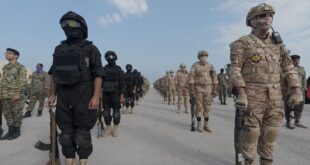Traders in Tyre’s bustling market say UN peacekeepers have brought “baraka†and a dose of good fortune to south Lebanon, making up at least in part for the ravages of last year’s Israel-Lebanon war.The United Nations Interim Force in Lebanon (UNIFIL) has spent millions of dollars on food and housing, while employing hundreds of locals in the region where they are deployed to keep Israeli troops and the Shiite fighters apart.
“The UNIFIL is a baraka [blessing], our business depends on them,†said Ali Zeidan, a souvenir store owner. “All these products are aimed at them,†he said, pointing to a wooden dish encrusted with mother of pearl and adorned with the Lebanese flag as well as those of the 28 other nations contributing troops to the force.
He also has on offer portable nargilehs, or water pipes, in tinted glass with the countries’ names in gilded arabesque writing.
“The market was frozen, but it is vibrant now,†he said, adding that “the Italians [the largest contingent] are the most generous, they have even learned to haggle.â€
Following the July-August 2006 war which devastated the country, the UN Security Council boosted the number of UNIFIL troops to 13,500 – from only 2,000 – in south Lebanon, where the force has been deployed since 1978.
The Lebanese army has since deployed up to the border with Israel for the first time in decades, and UNIFIL has reported no major incident between Hizbollah guerrillas and Israel.
However, extra security measures were adopted during a deadly 15-week battle in northern Lebanon between Islamist fighters and the Lebanese army that ended on September 2.
The Spanish contingent of UNIFIL was targeted in a June 24 car bombing that cost six lives and was praised by Al Qaeda. Amid an easing in tensions on the ground, “40 per cent of the $90 million allocated to purchasing in 2006-2007 has been spent locallyâ€, UNIFIL’s spokeswoman Yasmina Bouziane told AFP.
The troops, who themselves have spent $36 million this year, buy fuel, food, mineral water, construction material, stationery and office supplies from local businesses, as well as souvenirs and pirated DVDs.
“UNIFIL employs about 600 local people. But the number could reach 4,000 if we consider those directly hired by each contingent,†Bouziane said of interpreters, cashiers, drivers, mechanics, engineers, cleaners and secretaries.
“Even if each soldier spends a dollar a day it will bring in $13,000.â€
The region is also hosting hundreds of UNIFIL civilian personnel, some with their families, and foreign humanitarian workers such as demining experts and the Red Cross, who rent housing, buy food and send their children to school.
“The considerable funds available to UNIFIL and humanitarian organisations have created an economic effervescence prompting Beirut’s big businesses to open branches in the south,†said a manager of Banque Libano-Francaise, Antoine Hadid, in the port city of Tyre.
Financial transactions have increased by 40 per cent since 2006 in the south compared to only 6 per cent in Beirut, and seven banks have opened branches in Bint Jbeil, 125 kilometres south of Beirut, Hadid said.
The corniche seafront in Tyre is dotted with restaurants and cafes, including international chains. “The monthly rent is set at $1,000 for a cafe and $4,000 for a restaurant, they would not open if they lost money,†hotel owner Raymond Salha said.
His 13-room family-run hotel overlooking the sea is usually booked up by UNIFIL’s civil personnel families. “I do not take advantage of their presence, I have not changed the rates: $60 a night for a double room, including breakfast,†he said.
In a cellphone store, Fuad Hegazi is translating from Arabic to Portuguese for a high-ranking UNIFIL official. “I have worked with them for eight months, and I have earned $2,500 a month compared to the $500 I would be paid by a Lebanese employer,†said 30-year-old Hegazi, who also speaks Spanish, English and Romanian.
Things have started to look up for local carpenter Mounir too, who may take out a loan to refurbish three apartments which he rents out to UNIFIL’s civilian personnel.
“The rents have ramped up, a three-room apartment that was $600 a month in May is now worth 800 to $1,000,†he said.
 Eurasia Press & News
Eurasia Press & News



